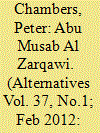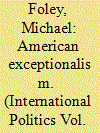| Srl | Item |
| 1 |
ID:
112753


|
|
|
|
|
| Publication |
2012.
|
| Summary/Abstract |
On June 7, 2006, Abu Musab al Zarqawi, the United States' 'public enemy number two', was killed by two 500lb bombs, dropped by US forces on the safe house in which he and others were hiding. This paper is about the making and unmaking of Al Zarqawi as a monster, and his curious afterlife as a governmental technology. As we pass the fifth anniversary of his death, this detailed study of Al Zarqawi offers an invaluable general lesson for the political analysis of terror. Zarqawi's monstration - his making and unmaking as a monster - tells us about the powers of naming and linking that characterize executive power in the age of globalized media systems, and the productive relation between diurnal practices of security work and the nocturnal phantasms of cultural memory carried by media which, this paper argues, drive and sustain wars in the twenty-first century.
|
|
|
|
|
|
|
|
|
|
|
|
|
|
|
|
| 2 |
ID:
082132


|
|
|
|
|
| Publication |
2007.
|
| Summary/Abstract |
Because American populism has traditionally been associated with indigenous themes and inward perspectives, it has never been thought to be particularly relevant to the United States' outlook upon the international order or its understanding of the generic requirements of foreign policy-making. However, recent developments surrounding the formulation and prosecution of the war on terror have cast doubts on this negative correlation. Using four thematic and analytical categories, the article reveals President Bush's close dependency upon characteristically populist principles in the way that the issue was presented to, and mediated with, the American public. It surveys the way that the Bush team employed populist narratives in advocating the need for alternative channels of international action outside both the customary agencies of collective security and the established conventions of international law. Although the usage of populist techniques was initially effective, the administration subsequently experienced some of the defects that have traditionally afflicted populism as an agency of political transformation
|
|
|
|
|
|
|
|
|
|
|
|
|
|
|
|
| 3 |
ID:
087569


|
|
|
|
|
| Publication |
2009.
|
| Summary/Abstract |
Why do some democracies break their security commitments whereas others do not? This study proposes a research strategy to answer the question by analyzing the timing of unilateral exits from a coalition military operation. Coalition participants typically do not exit until a military mission has been accomplished. However, in the case of the US-led coalition occupying Iraq since May 2003, 16 states have unilaterally withdrawn their armed forces. Despite the danger such defections may cause to the relationship of these states with the USA, why and when do they exit? The author creates a dataset with a state-month unit of analysis that contains information on 37 partner states and applies a Cox proportional hazard model. The study finds that the occurrence of a national election serves as a strong driving force to accelerate an exit from the coalition. An incumbent leader who faces a challenger who opposes military contributions in Iraq would reverse the policy to support the USA and exit the coalition to win an election, even at the risk of damaging a bilateral relationship with the USA. A change in leadership after an election, on the other hand, failed to be a predictor of the timing of defection. Furthermore, results reveal that the division of power within the government and the constitutional rules that enable significant parliamentary control over executive decisions to use force neither delay nor accelerate the timing of withdrawal. To understand the conditions under which democracies break their security commitments, more attention should be paid to election cycles than to a change in leadership and to types of democratic institutional and constitutional arrangements
|
|
|
|
|
|
|
|
|
|
|
|
|
|
|
|